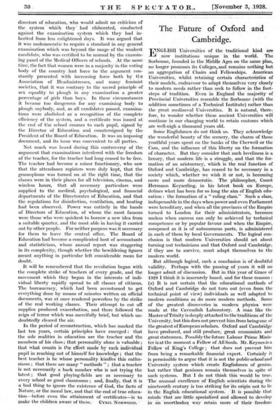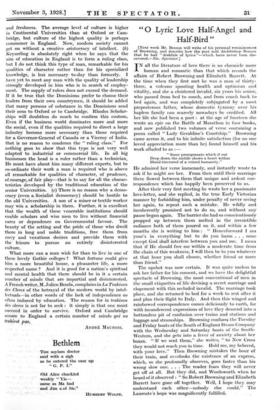The Future of Oxford and Cambridge.
T'NGLISH Universities of the traditional kind are now institutions unique in the world. The Sorbonne, founded in the Middle Ages on the same plan, no longer possesses its Colleges, and remains nothing but an aggregation of Chairs and Fellowships. American Universities, whilst retaining certain characteristics of their models, endeavour to adapt themselves- very closely to modern needs rather than seek to follow in the foot- steps of tradition. Even in England the- majority of Provincial Universities resemble the Sorbonne (with the addition sometimes of a Technical Institute) rather than the great mediaeval Universities. It is natural, there-, fore,. to wonder whether these ancient Universities will continue in our changing world to retain customs which are well-nigh a thousand years old.
Some Englishmen do not think so. They acknowledge the wonderful beauty of the scenery, the charm of those youthful years spent on the banks of the Cherwell or the Cam, and the influence of this liberty on the formation of character. But they consider that such loveliness is a luxury, that modern life is a struggle, and that the for- mation of an aristocracy, which is the real function of Oxford and Cambridge, has ceased to be necessary in a society which, whether we wish it or not, is becoming more and more democratic. The philosopher, Count Hermann Keyserling, in his latest book on Europe, defines what has been for so long the aim of English edu- cation : the formation of a " ruling class." Such a class, indispensable in the days when power and even Parliament were hereditary, and when all the provinces of the Empire turned to London for their administrators, becomes useless when success can only be achieved by technical competence or by popular favour and when the Empire, composed as it is of autonomous parts, is administered in each of them by local Governments. The logical con- clusion is that modern Universities should set about turning out technicians and that Oxford andCambridge, if they are to survive, must adapt themselves -to the modern world.
But although logical, such a conclusion is of doubtful validity. Perhaps with- the passing of years it will no longer admit of discussion. But in this year of Grace of 1928 I think it is insecurely based, and for these reasons : (a) It is not certain that the educational methods of Oxford and Cambridge do not turn out (even from the technical point of view) individuals as well adapted to modern conditions as do more modern methods. Some of the greatest discoveries in modern physics were made at the Cavendish Laboratory. A man like the Master of Trinity is deeply attached to the traditions of the University, but this does not prevent him from being one of the greatest of European scholars. Oxford and 'Cambridge have produced, and still produce, great economists and great statesmen. Possibly the future Labour Prime Minis- ter is at the moment a Fellow of All Souls. Mr. Keynes is a Fellow of King's College ; that does not prevent him from being a remarkable financial expert. Certainly it is permissible to argue that it is not the publieschool and University system which' create -Englishmen of genius, but rather that geniuses remain themselves in spite of Such systems. But I do not think this would be true. The unusual excellence of English scientists during the nineteenth century is too striking for its origin not to lie in the English educational system. It- is possible that minds that are little specialized and allowed to develop in an unorthodox wav retain more of their freedom and freshness. The average level of culture is higher in Continental Universities than at -Oxford or Cam- bridge, but culture of the highest quality is perhaps commoner in England. Now, modem society cannot get on without a creative aristocracy of intellect. (b) Keyserling is absolutely right when he says that the aim of education in England is to form a ruling class, but I do not think this type of man, remarkable for his qualities of character rather than for his specialized knowledge, is lesi- necessary to-day than formerly. I have yet to meet any man with the quality of leadership strongly developed in him who is in search of employ- ment. The supply of rulers does not exceed the demand. If it be true that the Dominions prefer to choose their leaders from their own countrymen, it should be added that many persons of substance in the Dominions send their sons to Oxford or to Cambridge. Rhodes Scholar- ships will doubtless do much to confirm this custom, Even if the business world dominates more and more the social, even if the qualities required to direct a large industry become more necessary than those required for a Governor-General of Canada or a Viceroy of India. that is no reason to condemn the " ruling class." For nothing goes to show that this type is not very well adapted to industrial or commercial life. In all big businesses the head is a ruler rather than a technician. He must have about him many different experts, but to co-ordinate their work a man is required who is above all remarkable for qualities of character, of prudence, of courage, of fair play—that is to say for all the charac- teristics developed by the traditional education of the senior Universities. (c) There is no reason why a demo- cracy (even a Socialist democracy) should be hostile to the old Universities. A son of a miner or textile worker may win a scholarship in them. Further, it is excellent that the wealth of these venerable institutions should enable scholars and wise men to live without financial cares or dependence on Governmental favour. The beauty of the setting and the pride of those who dwell there in long and noble traditions, free them from envy and vexatious desires and provide them with the leisure to pursue an entirely disinterested culture.
What more can a man wish for than to live in one of these lovely Gothic colleges ? What fortune could give him a more beautiful house, a pleasanter life, a more respected name ? And it is good for a nation's spiritual and mental health that there should be in it a certain number of minds that are impartial and disinterested. A French writer, M. Julien Benda, complains in La Trahison des ClereS of the betrayal of the modern world by intel- lectuals—in 'other words of the lack of independence so often induced by education. The reason for la trahison des c2eres is not far to seek : it simply is that one miiSt succeed in order to survive. Oxford and Cambridge assure to England a certain number of minds qui ne trakirot pas., ANDRA MAURO'S.



















































































































 Previous page
Previous page